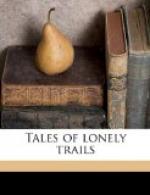During the summer I had purchased a famous chestnut sorrel horse named Don Carlos. He was much in demand among the motion-picture companies doing western plays; and was really too fine and splendid a horse to be put to the risks common to the movies. I saw him first at Palm Springs, down in southern California, where my book Desert Gold was being made into a motion-picture. Don would not have failed to strike any one as being a wonderful horse. He was tremendously high and rangy and powerful in build, yet graceful withal, a sleek, shiny chestnut red in color, with fine legs, broad chest, and a magnificent head. I rode him only once before I bought him, and that was before I hurt my back. His stride was what one would expect from sight of him; his trot seemed to tear me to pieces; his spirit was such that he wanted to prance all the time. But in spite of his spirit he was a pet. And how he could run! Nielsen took Don to Flagstaff by express. And when Nielsen wrote me he said all of Flagstaff came down to the station to see the famous Don Carlos. The car in which he had traveled was backed alongside a platform. Don refused to step on the boards they placed from platform to car. He did not trust them. Don’s intelligence had been sharpened by his experience with the movies. Nielsen tried to lead, to coax, and to drive Don to step on the board walk. Don would not go. But suddenly he snorted, and jumped the space clear, to plunge and pound down upon the platform, scattering the crowd like quail.
The day before my departure from Los Angeles was almost as terrible an ordeal as I anticipated would be my first day’s ride on Don Carlos. And this ordeal consisted of listening to Romer’s passionate appeals and importunities to let him go on the hunt. My only defence was that he must not be taken from school. School forsooth! He was way ahead of his class. If he got behind he could make it up. I talked and argued. Once he lost his temper, a rare thing with him, and said he would run away from school, ride on a freight train to Flagstaff, steal a horse and track me to my camp. I could not say very much in reply to this threat, because I remembered that I had made worse to my father, and carried it out. I had to talk sense to Romer. Often we had spoken of a wonderful hunt in Africa some day, when he was old enough; and I happened upon a good argument. I said: “You’ll miss a year out of school then. It won’t be so very long. Don’t you think you ought to stay in school faithfully now?” So in the end I got away from him, victorious, though not wholly happy. The truth was I wanted him to go.
My Jap cook Takahashi met me in Flagstaff. He was a very short, very broad, very muscular little fellow with a brown, strong face, more pleasant than usually seen in Orientals. Secretly I had made sure that in Takahashi I had discovered a treasure, but I was careful to conceal this conviction from R.C., the Doyles, and Nielsen. They were glad to see him with us, but they manifestly did not expect wonders.




